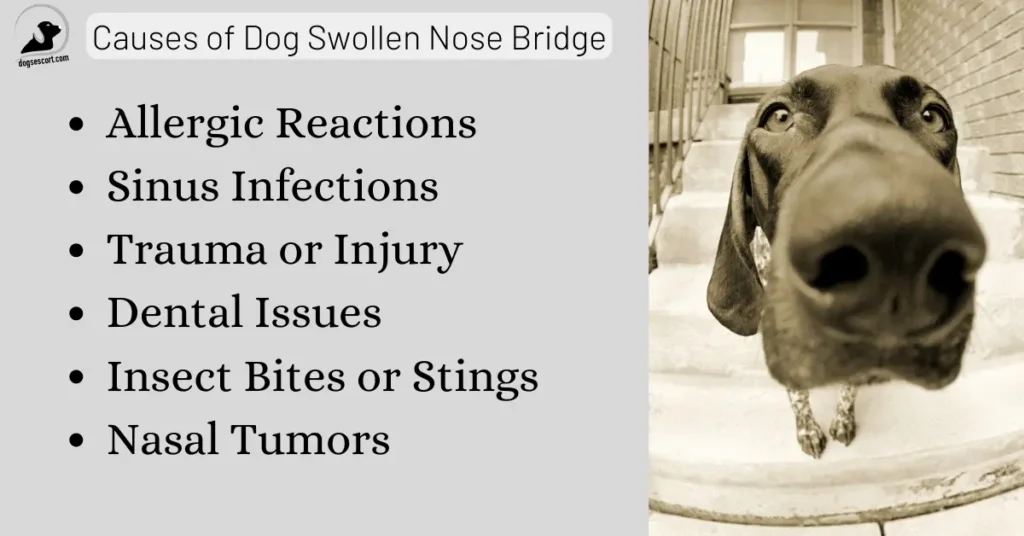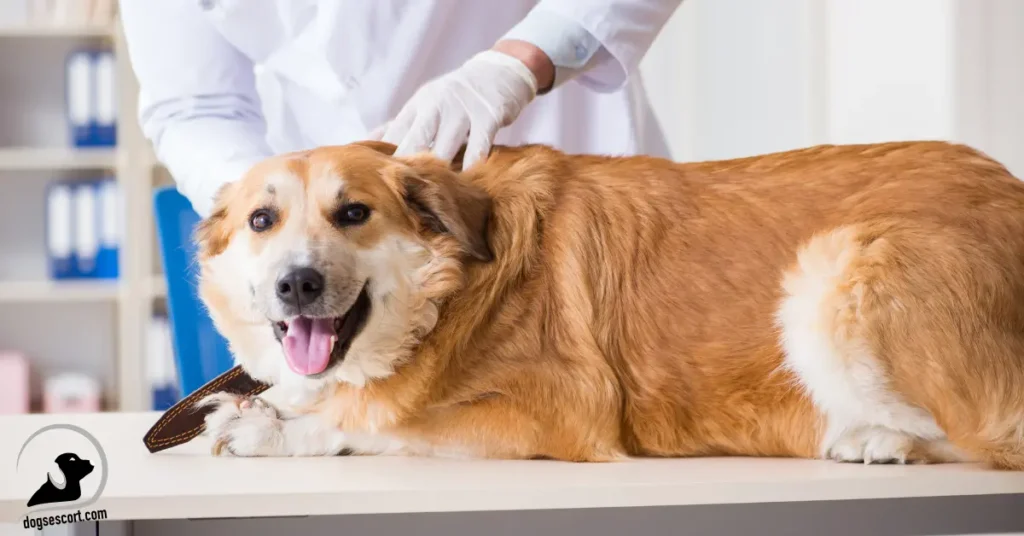When it comes to our furry friends, their health and well-being are of utmost importance. One concerning issue that dog owners may encounter is a swollen nose bridge.
Why is my dog nose bridge swollen?
- The Leading causes of swollen dog nose bridge include allergic reactions, sinus infections, trauma or injury, dental issues, insect bites or stings, and rarely Nasal Tumors.
- To accurately diagnose and treat the condition, it is advisable to consult a veterinarian who can provide appropriate guidance based on their examination and professional expertise.
This comprehensive article will explore the various causes behind a canine’s swollen nose bridge, discuss effective treatment options, and provide valuable insights on prevention strategies.
So, if you’ve noticed your beloved canine companion with a swollen nose bridge, read on to understand the potential reasons and find the best course of action.
Understanding the Swollen Nose Bridge
The nose bridge of a dog refers to the area between its nostrils, where the nasal bones are located. When this area becomes swollen, it can indicate an underlying health problem that requires attention.
A swollen nose bridge can present itself as redness, puffiness, or an increase in size, causing discomfort and potential difficulty for the dog to breathe or smell properly.
Causes of Dog Swollen Nose Bridge

Allergies
Dogs, just like humans, can suffer from allergies. Allergic reactions to environmental factors such as pollen, dust mites, certain foods, or insect bites can lead to swelling in the nose bridge area.
Sinus Infections
Bacterial or viral infections in the sinuses can cause inflammation and swelling of the nose bridge.Canines may exhibit symptoms such as sneezing, nasal discharge, and a loss of appetite.
Trauma or Injury
Accidental trauma or injury to the nose can result in swelling and pain. Furry friends that engage in rough play, fight with other animals, or accidentally experience falls may develop a swollen nose bridge.
Dental Issues
Dental problems, such as periodontal disease or abscesses, can cause referred pain and inflammation in the nose bridge.
This inflammation occurs when bacteria from the mouth spread to the nasal area.
Insect Bites or Stings
Some pets may have an allergic reaction to insect bites or stings, leading to localized swelling around the nose bridge.
Nasal Tumors
Although less common, nasal tumors can cause swelling and deformities in the nose bridge. If you notice persistent swelling accompanied by other concerning symptoms, such as bleeding or weight loss, consult a veterinarian promptly.
Treatment Options for a Dog Swollen Nose Bridge
Identifying the Underlying Cause
Since the swelling in the nose can stem from various factors, it is crucial to determine the root cause.
A visit to the veterinarian is essential for an accurate diagnosis through physical examination, imaging tests, or laboratory analysis.
Medication
Depending on the cause, your veterinarian may prescribe appropriate medication to address the underlying issue. This can include antihistamines for allergies, antibiotics for infections, or pain relievers to alleviate discomfort.
Topical Treatments
Sometimes, your veterinarian may recommend topical treatments to reduce inflammation and promote healing. These can include soothing ointments or creams to alleviate swelling and provide relief.
Surgery
In severe cases or when a tumor in the nose area, your vet may prescribe surgery. Surgical intervention can help remove the underlying cause of the swelling and restore the dog’s nose to its normal state.

Preventing Swollen Nose Bridge in Dogs
While not all cases of a swollen nose can be prevented, there are steps you can take to minimize the risk:
-
Ensure your dog receives routine check-ups to catch any health issues early on.
-
Good oral hygiene is essential for your dog’s health. Regular brushing of their teeth, providing dental chews, and scheduling professional dental cleanings can help prevent dental problems that may contribute to a swollen nose bridge.
-
If your puppy has specific allergies, minimize their exposure to allergens. Keep them away from known triggers, such as certain plants, chemicals, or foods, to reduce the risk of allergic reactions.
-
Protect your pup from insect bites and stings by using appropriate insect repellents, keeping them away from areas with a high insect population, and ensuring their environment is free from pests.
-
When canines engage in rough play or interact with other animals, there is a higher risk of accidental trauma or injury. Supervise their playtime and intervene to prevent injuries that may lead to a swollen nose.
-
Proper nutrition plays a significant role in maintaining your dog’s overall health. Ensure they are on a balanced diet that meets their nutritional needs, as a healthy immune system can help prevent various health issues, including nasal inflammation.
You May Also Like To Read:
FAQ
Why is my dog pawing swollen face?
A swollen face in dogs can be caused by various factors. One common reason is an allergic reaction, which could be triggered by food, insect bites, or environmental allergens. Another possibility is an infection, such as a dental abscess or a skin infection.
In some cases, facial swelling can be a sign of trauma or injury, like a bee sting or a facial bone fracture.
Will my dog’s swollen face go away?
The duration of swollen face in dogs depends on the underlying cause. If the swelling is due to a minor allergic reaction, it may resolve on its own within a few hours or days, especially if the allergen is removed and your dog is not exposed to it again.
However, if the swelling is persistent, worsening, or accompanied by other concerning symptoms, it is crucial to consult a vet to diagnosis and treatment.
Why is my dog’s nose swollen on one side?
A swollen nose in dogs, particularly on one side, can indicate several potential causes. One possibility is an insect bite, which can result in localized swelling. Another common reason is trauma or injury to the nose, such as a bump or a scratch.
Nasal infections or sinusitis may cause swelling on one side of the nose. In some cases, tumors or growths can develop within or around the nasal area, leading to asymmetrical swelling. Other potential causes include dental issues, nasal foreign bodies, or certain autoimmune conditions.
My Final Thoughts
A swollen nose bridge in dogs can cause concern, indicating an underlying health issue. Allergies, sinus infections, trauma, dental problems, insect bites, or even nasal tumors can contribute to this condition.
Timely diagnosis and treatment by a veterinarian are crucial to address the underlying cause and alleviate discomfort for your furry companion.
Remember to follow the prescribed treatment options, including medication, topical treatments, or surgery if necessary.
Implementing preventive measures such as regular veterinary check-ups, maintaining dental hygiene, minimizing exposure to allergens, protecting against insects, supervising playtime, and providing a healthy diet can boost immunity and improve resistance against certain canine illnesses.
By staying vigilant and proactive in your dog’s health, you can ensure their well-being and happiness, giving them the best chance at a healthy and comfortable life.



